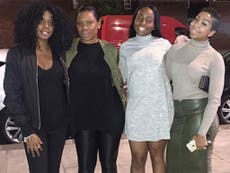Black millionaire denied entry to top London bar claims he was racially profiled
Exclusive: Lamar Berko was turned away from 100 Wardour Street, in Soho, but then forced to watch numerous white people being admitted
Your support helps us to tell the story
From reproductive rights to climate change to Big Tech, The Independent is on the ground when the story is developing. Whether it's investigating the financials of Elon Musk's pro-Trump PAC or producing our latest documentary, 'The A Word', which shines a light on the American women fighting for reproductive rights, we know how important it is to parse out the facts from the messaging.
At such a critical moment in US history, we need reporters on the ground. Your donation allows us to keep sending journalists to speak to both sides of the story.
The Independent is trusted by Americans across the entire political spectrum. And unlike many other quality news outlets, we choose not to lock Americans out of our reporting and analysis with paywalls. We believe quality journalism should be available to everyone, paid for by those who can afford it.
Your support makes all the difference.A Black millionaire and celebrity jeweller who was denied entry to a popular London bar says he was racially profiled.
Lamar Berko, 30, queued to enter 100 Wardour Street in Soho, West End, with eight Black friends last week but said they were turned away from the restaurant and given conflicting reasons about why.
Mr Berko said the group was blocked from entering by a door attendant who said there were “too many men” among them, only to then watch as multiple white people in the queue were “waved” through the doors.
“In my field, I’m used to dealing with racism. In this country, it’s always indirect and never direct. For example, I’ve been stopped by the police so many times for no reason other than the car I drive,” Mr Beko said.

“But I could not believe my eyes when the staff member took my friends and out of the queue - making everyone look at us as if we were troublemakers – then let in all white people and not us. I haven’t slept; I felt so violated.”
Mr Berko has worked with some of the world’s biggest stars including David Beckham, Burna Boy, Steff London, Wizkid, Callum Hudson-Odoi and Joey Essex.
The entrepreneur, who runs LB Jewellery, built his empire after being kicked out of school at the age of 15. After becoming a jewellery consultant aged 19, he went on to launch his own business.

Mr Berko said he questioned the door attendant on why the group was refused entry when others were allowed in after being given differing reasons. At first, he said they were told there were too many men and were later told the venue was packed, even though he said the bar was nowhere near capacity.
Mr Berko said he told the employee he felt racially profiled and was told: “I don’t judge by the race, just by the person.”
The jeweller said he felt compelled to explain what he does for a living and even Googled his name to show the door attendant. The staff member said he would consult colleagues inside but the group was still denied, despite Mr Berko’s offer to purchase tables to the value of £10,000.
“I didn’t even ask the price of the tables – but this was turned down. What reason would they really have to say no?”
“I wasn’t causing trouble or shouting; I didn’t flare up or swear,” Mr Berko said.
Ben Cavila, 33, who was also part of the group and had driven from Northampton to meet Mr Berko and friends for the evening, said: “I’ve been through this before, where I’ve been turned away at the door of a Central London venue, so I wasn’t particularly shocked.”

Another friend, 33-year-old Gregory Nicholls told The Independent: “We weren’t causing any issues; it’s not like we were lairy young lads outside. We were quiet in the line, good as gold. If you were going to make any assumptions about us that we were any kind of a threat, that wouldn’t have come across from our behaviour.
“This is something that happened to me throughout my 20s. It’s disappointing that, in my 30s, I’m finding myself in the same situation. It feels like the fact that we’re Black means that we’re not considered good enough to enter certain places in this country, despite having the financial means. It’s sad.”
After Mr Berko posted about his negative experience on Snapchat, 100 Wardour Street’s Instagram page was flooded with criticism from users. The restaurant later posted photographs of Black women on their stories.

“When people started getting on to them, they went on their 24-hour Instagram story and posted photographs of Black women, back to back. I find that to be such a mockery,” Mr Berko said.
He continued: “I want them to understand that what they’ve done is mad. I am speaking out because they’re not going to make me feel like I’m crazy. The only difference between my friends and I, and everyone else who was let in was our ethnicity.”
100 Wardour Street has not responded to multiple requests for comment from The Independent.



Join our commenting forum
Join thought-provoking conversations, follow other Independent readers and see their replies
Comments